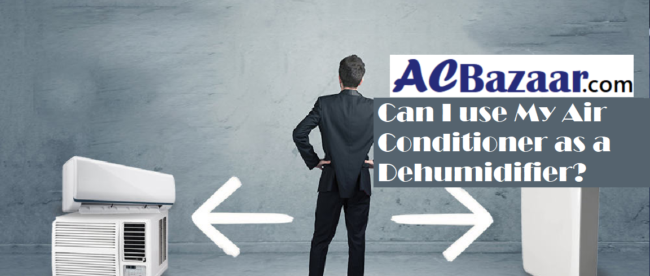Can I use My Air Conditioner as a Dehumidifier?
Air conditioners and dehumidifiers serve different purposes, but there is some overlap in their functions. While air conditioners primarily cool the air, they also remove some moisture from the air as a byproduct. This article explores whether you can effectively use your air conditioner as a dehumidifier, highlighting their differences and providing insights on optimizing humidity control in your home.
- Cooling vs. Dehumidification – Air conditioners are primarily designed to cool the air by removing heat, whereas dehumidifiers focus on reducing the moisture content in the air. While air conditioners do remove some moisture during the cooling process, their dehumidification capacity is typically lower compared to dedicated dehumidifiers.
- Limited Dehumidification Efficiency – Air conditioners dehumidify the air indirectly by condensing moisture on the evaporator coil. However, their dehumidification capability is limited because they prioritize cooling. If you live in an extremely humid environment or require precise humidity control, a dedicated dehumidifier would be more effective.
- Shorter Run Cycles – Air conditioners are designed to cycle on and off to maintain the desired temperature. This shorter run cycle may not provide sufficient time for the unit to dehumidify the air adequately. Dehumidifiers, on the other hand, are designed to run continuously for longer periods, allowing them to extract more moisture from the air.
- Humidity Setpoint – Air conditioners typically have a temperature-based thermostat, whereas dehumidifiers feature a humidity-based control. Air conditioners prioritize temperature control, so they may not effectively maintain a specific humidity level. If humidity control is a priority, a dedicated dehumidifier with adjustable humidity settings is recommended.
- Energy Efficiency Considerations – Using an air conditioner solely for dehumidification purposes may not be energy-efficient. Air conditioners consume more energy compared to dehumidifiers, and running an air conditioner continuously solely for dehumidification can lead to higher energy consumption and utility costs. Opting for a separate dehumidifier can help save energy and reduce costs.
- Optimal Humidity Control – For optimal humidity control in your home, it is recommended to use a combination of strategies. Utilize your air conditioner for cooling and some dehumidification during hot and humid periods. Additionally, use a dedicated dehumidifier to effectively maintain a specific humidity level, especially in areas where excess moisture is a concern.
Air Conditioner vs. Dehumidifier
| Aspect | Air Conditioner | Dehumidifier |
|---|---|---|
| Primary Function | Cooling the air | Removing moisture from the air |
| Dehumidification Capacity | Limited, as it focuses on cooling the air | Higher capacity, designed for moisture extraction |
| Run Cycles | Shorter cycles for temperature control | Longer continuous cycles for moisture removal |
| Humidity Setpoint | Temperature-based control | Humidity-based control |
| Energy Efficiency | Consumes more energy | More energy-efficient for dehumidification |
| Optimal Humidity Control | Effective for some dehumidification | More precise control with adjustable settings |
While air conditioners do remove some moisture from the air, they are not as effective as dedicated dehumidifiers. Air conditioners primarily focus on cooling, and their dehumidification capacity may be limited. For precise humidity control and efficient moisture removal, it is advisable to use a dedicated dehumidifier alongside your air conditioner. This approach ensures both effective cooling and optimal humidity management in your home.




Leave a comment